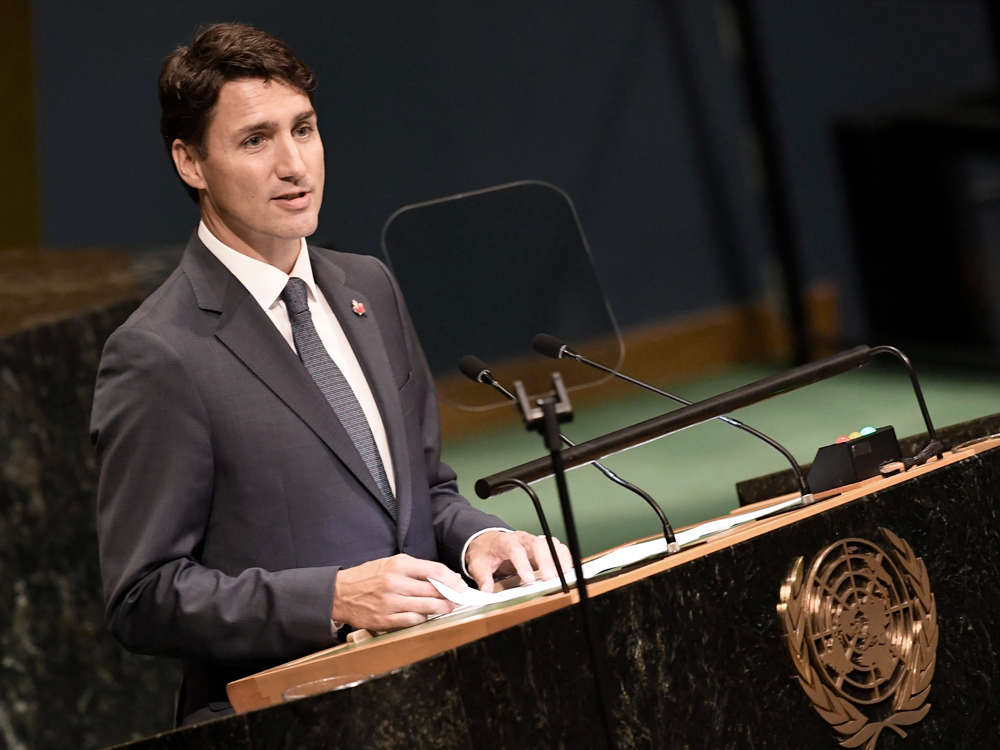Before he hurried back to Ottawa to defend his government — fairly ineffectively — against a battering in the House of Commons, Canada’s prime minister was at the United Nations in New York doing something he’s good at: schmoozing, shaking hands and being generally cheerful.
His goal was to win support for a vote that won’t happen until 2021, three years down the road. The vote is for a two-year stint in one of the temporary seats on the UN Security Council. Asked at his closing press conference for “something tangible” Canada would do with the seat, he responded that “one of the things we’ve seen is there’s an appetite for Canada’s approach and Canada’s solutions in growing the middle class, and promoting diversity as a strength.”
The notion that the world is crying out for Canada’s leadership in growing the middle class may come as a surprise to Venezuelan President Nicolas Maduro, who took time out from leading his country deeper into chaos and despair to blame it all on “the oligarchies of the continent — and those who rule them from Washington — (who) want control of Venezuela.” Never mind the collapse of the economy, the terrifying surge in murders and kidnappings, and the flight of millions of Venezuelans seeking to escape the madness, Maduro wanted everyone to know that “Venezuela is on its feet … and will never come to its knees.”
If you sense a disconnect here, it’s because it would be difficult to miss. Maduro wasn’t alone in making clear just how unsettled the world has become as corruption, autocracy and the weakness of Western leadership has opened the way to the ruthlessness of “strongmen” like Maduro, Russia’s Vladimir Putin and the ruling theocrats of Iran, with their puppets and imitators in places like Syria and Turkey.
Iranian President Hassan Rouhani used his moment on the New York stage to suggest President Donald Trump suffered from “weakness of intellect” and assert that “what’s important is that today, other than one or two countries, no one is supporting America. … It’s a historic political isolation that is rare for America.”
The thing is, Rouhani’s charge had the ring of truth. When Trump opened his mouth to claim his administration had accomplished more than any other in U.S. history, the audience cracked up. Trump insisted “they weren’t laughing at me, they were laughing with me,” which would undoubtedly have drawn another guffaw if the crowd had been given a chance.
With all this going on, and a watching audience pining for a show of leadership, Canada’s prime minister was preoccupied with a temporary seat to be decided at a time he might no longer be prime minister, on a council whose five permanent members hold a veto that makes the other 10 members little more than interested observers. If there is a more acute example of the Trudeau government’s preoccupation with symbolism over action, and style over substance, it’s hard to imagine.
It demonstrates once again the great difficulty this government has in adjusting to changed circumstances. It beavers on with its fixed agenda no matter what developments the world throws at it. When Stephen Harper’s government made a half-hearted bid for a council seat eight years ago, and lost, the Liberals made great hay out of the supposed snub. Canada was up against Germany and Portugal, and when the vote went to Portugal, opposition members treated it as evidence of Ottawa’s sad decline on the international stage. In reality, the result was a consequence of Harper’s government viewing the UN as largely an irrelevance. In 2009, he picked a photo op at a Tim Horton’s in Oakville rather than delivering an address to the UN. Liberal leader Michael Ignatieff noted that, “this is a government that for four years has basically ignored the United Nations and now is suddenly showing up saying, ‘Hey, put us on the council.’” True enough. If anyone was snubbed, it was the UN itself, by a government that saw more important issues than mouthing empty speeches to empty seats.

But to the Trudeau government, bold assertions is what it’s all about. In the competition for a security council seat, Canada is facing Ireland and Norway. You would have a hard time finding anyone who seriously believes that victory by either of those countries would be a blow to Western values or the future of democracy. Ireland is deemed the current favourite, because it spends more on foreign aid than Canada, and has contributed more peacekeeping troops than either of the other two. You may recall that Trudeau’s Liberals loudly proclaimed their devotion to peacekeeping and their determination to revive Canada’s reputation — which existed largely in their own mind to begin with — during the 2015 election. Since then they’ve dawdled and fiddled, wringing their hands and agonizing over which country would be the best to host a small Canadian force, before finally getting around to it almost three years into office. The result: UN figures show Ireland has contributed 521 troops to our 173. A country with 4.8 million people to Canada’s 36 million has sent three times more troops. But we talk a good game.
While seeking to upset Ireland, Canada also revealed in New York that it will join a bid to have the International Criminal Court investigate Venezuela’s Maduro. It’s the first time in 20 years Ottawa has sought to take another country to the ICC. It also comes at a time the ICC has become mainly known for its ineffectiveness: four convictions, at a cost of $1 billion, and a history of being ignored by those it seeks to bring to justice.
It’s another excellent opportunity for Canada to make a show of influence while being required to take no concrete action. Right up Trudeau’s al























